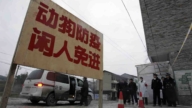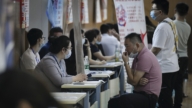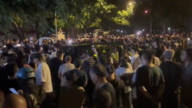【新唐人2011年11月3日讯】日前,中国广东珠海市传来推出楼市“双限”新政的消息。珠海市政府在夜晚发布的限购、限价令,让众多的开发商挠头到天亮,商讨对策。分析人士认为,北京当局一再下重手遏制房地产市场,是因为中国房地产崩盘的“可能性”已经存在。
10月31号晚,珠海市政府发文声称,11月1号起,珠海将实行限购政策,从而成为广东第四个限购城市。目前中国的限购城市已经上升到47个。
让开发商感到要命的是,除了限购,还限价。新房的价格限定为每平方米11285元,但在珠海楼市上,主要楼盘的销售价格都是在每平方米14000元以上。
纽约市立大学经济学教授陈志飞表示,从最近的调控手段来看,北京当局确实下了狠心要控制房价。
陈志飞:“如果用限购,或者是行政的手段把这个价格每平米多少钱都规定出来的话,那开发商各方面获利的机会就大大的削弱了,我感觉市场会因此作出很大的调整。像珠海这样的(二线)城市,如果楼市再经历一些大的震荡,我觉得说明一线楼市大的调整,现在已经开始了这样的迹象,可能会越演越烈,甚至这一波震荡会涉及到中国的三线城市,直至最后引起整个中国楼市坍塌或者崩溃,这都是有可能的。”
中共国务院年初发出通知,要求地方严控房价上涨,如超过年度控制目标,要对相关负责人进行问责。今年2月份,中共总理温家宝在全国人大政协两会前,与网友连线交谈时表示了遏抑通胀与楼价的决心。
陈志飞分析,中共打压通货膨胀的手段和力度相对于楼市来讲,要软很多。因为通货膨胀对中共的利益更加生死攸关。
陈志飞:“用通货膨胀来挖空老百姓的钱来冲掉地方和银行的坏账和债务,是中共的一贯政策,所以我并不觉得通货膨胀会在很大程度上被抑制住,因为通货膨胀如果下来的话,将会使地方债务的危机一下凸显出来了,因为银行的坏账也会暴露的淋漓尽致,这样,就会造成中共整个银行或者是金融系统的一个大的灾难。”
陈志飞认为,中国的房价之高已经到了让百姓难以承受的临界点,将引发严重的社会动荡直接影响到中共的政权。当局是想在保持通胀这个前提下,限制楼市。因为楼市抑制不住的话,同样通货膨胀也不保。
此前不久,广东佛山政府解禁限购令,但在一天之间,就被北京打回原形。从珠海市突击发布“双限令”来看,房地产业内人士分析,地方政府对于房价调控目标的焦虑达到一个临界点。
陈志飞:“珠海这个事情其实是一个很明确的信号,还是具有很强的像征意义,因为此前的限购令只是在一线城市实施。现在珠海这个二线城市也主动的颁发这种类似的限购令,说明这种限购、限价这种行政指令可能会在中国的城市蔓延开来。所以可以看出来,中国楼市崩盘,不仅有这种迹象,可能已经到来了。”
中国房地产指数系统(China Real Estate Index System)周二发布的资料显示,今年10月中国住宅地产均价环比下降0.23%,已连续第二个月下跌。
美国《华尔街日报》11月1号题为《中国楼市崩盘可能性有多大?》的文章,对中国的楼市前景做了一个预测。
文章分析,习惯了房价只涨不跌的购房人采取观望态度,那么房屋销量将会下降,开发商将被迫贱卖存量房,并在危机中放缓投资。投资大幅下滑会让中国GDP增速降低不止两个百分点。
文章指出,金融系统也难逃一劫。因为中国银行业大约20%的贷款直接和地产业相连,另外16%则借给了地方政府。地方财政中40%的收入来自土地出让金。
文章预测,房价下跌将导致土地出让价格下跌,同时加大地产开发商和地方政府的违约风险。随着经济增速放缓,资产品质下降,中共政府将要应对一场全面危机。
新唐人记者梁欣、李静、黎安安采访报导。
China’s Property Market Collapse may have already Come
Recently, a double-limit policy on the local property market
was issued by Chinese Communist Party (CCP) authorities in Zhuhai city, Guangdong.
Analysts say, the Beijing regime have repeatedly and heavily
curbed the property market, showing that the “possibility"
of China’s real estate collapse already exists.
In the evening on the31st October, the CCP authorities of
Zhuhai issued a statement, saying that since the
1st November, the city would implement a house purchasing
limit policy, becoming the 4th city in Guangdong.
Currently, 47 cities in China are limiting home purchasing.
What makes real estate developers feel really terrible is that
not only is purchasing limited, but prices too.
The price of new homes is limited to RMB 11,285
per square meter.
However, in the local current property market, sale prices of
major properties are all over RMB 14,000.
Chen Zhifei, a professor of economics at the City University
of New York, said that the regulatory intervention imposed
recently by CCP authorities shows that the Beijing regime
has truly intended to control housing prices.
Chen Zhifei: “Using the house purchasing limit policy or
administrative means to set the housing sales prices,
will greatly reduce developers’ opportunities to make profits.
I think that the market will make a lot of adjustments.
If the property markets in Zhuhai among other second-tier
cities suffer big shocks, that will indicate big adjustments
in the property markets of first-tier cities have begun, and
will possibly heat up. The shock wave may even reach
China’s third-tier cities, until finally triggering the whole
property market to collapse. All this is now a possibility."
In early 2011, CCP State Council issued an instruction that
required local authorities strictly control housing prices.
If the prices are beyond the annual target, the responsible
officials will bear accountability.
This February, CCP Premier Wen Jiabao, expressed online
his determination to curb inflation and property prices.
Chen Zhifei analyzed that compared with suppressing the
property market, the CCP authorities’ means and efforts to suppress inflation, is much weaker.
This is because inflation is more vital to CCP
in terms of interests.
Chen Zhifei: “Using inflation to write off local authorities’
bad debts and liabilities, is CCP’s standard policy.
So I don’t think inflation will be largely suppressed.
If inflation comes down, CCP local authorities’ debt crisis
will be exposed completely, as well as bad debts in banks.
That will bring a great disaster to the CCP’s whole banking
system or its financial system."
Chen Zhifei commented, China’s high housing prices
have reached a critical point.
Civilian unrest will lead to serious social unrest
that will directly threaten the CCP’s ruling.
CCP authorities want to maintain inflation first.
Under this precondition, through restricting property markets,
if the latter cannot be suppressed, inflation will not be secured either.
Not long ago, CCP local authorities of Foshan, Guangdong,
lifted the home purchasing limit order,
however, Beijing authorities set the limit order again
on real estate markets overnight.
As to Zhuhai authorities’ issuing the double-limit order,
real estate industry insiders analyzed that local authorities’
worrying about controlling property sale prices,
has reached a critical point.
Chen Zhifei: “Zhuhai’s offical practice actually sent a
very clear signal. Previously, the purchasing limit order
was only implemented in China’s frst-tier cities. But now, the
second-tier cities such as Zhuhai have also started issuing
similar limiting orders. This shows, mandatory instructions of
this kind will be widely adopted by cities across China.
That is to say, China’s property market collapse, not only
has shown such a sign, but may have already arrived."
China Real Estate Index System data released on 1st Nov.
show that in October, the average price for China’s
residential property fell 0.23% month-to-month,
the second month in a row of falling prices.
An article in the Wall Street Journal dated 1st November,
titled “What are the Chances that
China’s Property Market will Collapse?",
making an outlook forecast.
The article analyzed that those buyers who are used to
prices moving only upward will adopt a wait-and-see
attitude, causing property sales volumes to fall.
Developers will be forced to sell cheaply in-stock houses,
and will slow down their investment in the crisis.
The investment’s sharp drop will decrease China’s GDP
by more than two percentage points.
The article pointed out that China’s financial system would
also find it hard to escape, because about 20% of banking
loans are tied up in real estate.
Another 16% is lent to local authorities.
40% of local fiscal revenue comes from selling land to
property developers.
The Wall Street Journal’s article predicted that a decline in
housing prices will result in the falling of land sales prices.
This will also increase the default risk of property developers
and of local authorities.
With China’s economic slowdown and asset qualities
deteriorating, the CCP authorities will face a full-scale crisis.
NTD reporters Liang Xin, Li Jing and Li Anan.






























